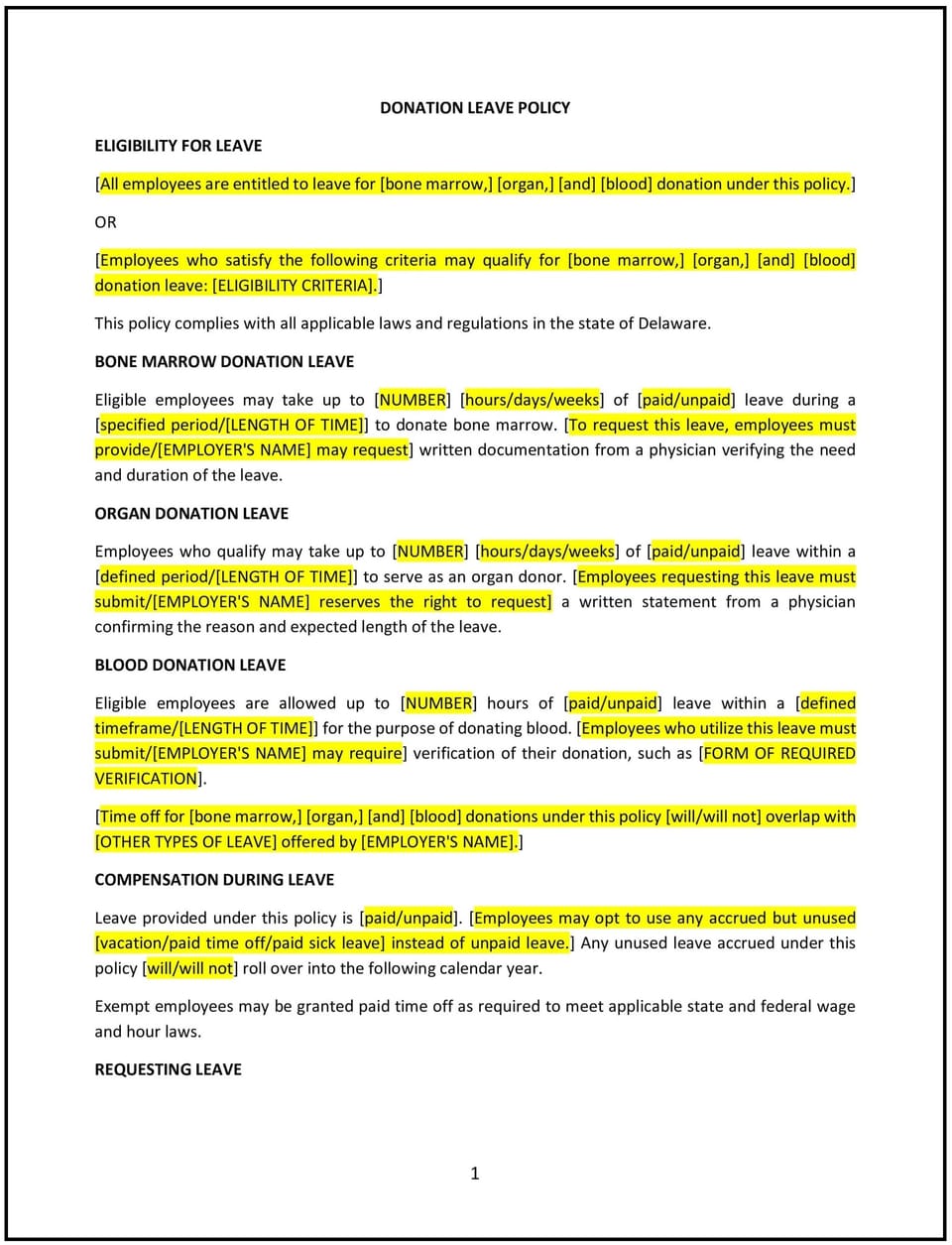Donation leave policy (Delaware): Free template

Donation leave policy (Delaware)
A donation leave policy helps Delaware businesses support employees who wish to donate blood, organs, or other life-saving resources by providing them with paid or unpaid leave. This policy outlines eligibility, leave duration, and procedures for requesting donation leave, ensuring compliance with Delaware laws and promoting employee well-being.
By implementing this policy, businesses can foster a culture of care, improve employee morale, and demonstrate social responsibility.
How to use this donation leave policy (Delaware)
- Define eligibility: Specify which employees qualify for donation leave, such as full-time or part-time employees, and the types of donations covered (e.g., blood, plasma, organ).
- Specify leave duration: Clarify the amount of leave provided, including paid or unpaid time off, based on the type of donation and Delaware regulations.
- Outline the request process: Provide clear instructions for employees to request donation leave, including required notice periods and any supporting documentation.
- Ensure compliance: Align the policy with Delaware laws, such as requirements for organ donation leave, to ensure legal adherence.
- Promote awareness: Educate employees about the availability of donation leave and the importance of life-saving contributions.
- Monitor and review: Track leave requests and evaluate the policy’s effectiveness to ensure it meets employee and organizational needs.
Benefits of using this donation leave policy (Delaware)
This policy offers several benefits for Delaware businesses:
- Promotes social responsibility: Encourages employees to contribute to life-saving causes, reflecting positively on the company’s values.
- Enhances employee morale: Demonstrates support for employees’ altruistic efforts, fostering loyalty and satisfaction.
- Improves retention: Shows care for employees’ personal and philanthropic goals, strengthening workplace relationships.
- Ensures legal compliance: Aligns with Delaware regulations for donation leave, reducing the risk of legal disputes.
- Builds community goodwill: Positions the company as a socially responsible employer, enhancing its reputation.
Tips for using this donation leave policy (Delaware)
- Communicate the policy clearly: Ensure employees are aware of their rights and the process for requesting donation leave.
- Simplify the request process: Provide straightforward instructions and forms to make it easy for employees to apply for leave.
- Encourage participation: Promote awareness of donation opportunities and highlight the company’s support for such initiatives.
- Align with laws: Regularly review the policy to ensure compliance with Delaware and federal regulations for donation leave.
- Track usage: Maintain records of donation leave requests to monitor participation and address any gaps in the policy.
Q: Why is a donation leave policy important for my business?
A: This policy supports employees’ efforts to save lives, promotes social responsibility, and demonstrates the company’s commitment to employee well-being and community contributions.
Q: What types of donations are covered under this policy?
A: The policy typically covers blood, plasma, organ, or other life-saving donations. Businesses can customize the scope based on their objectives and Delaware laws.
Q: How much leave is provided for donation purposes?
A: Leave duration depends on the type of donation. For example, blood donation may require a few hours, while organ donation may necessitate extended time off. The policy should specify these details.
Q: Do employees need to provide documentation for donation leave?
A: Yes, employees may need to provide documentation, such as proof of appointment or medical certification, as outlined in the policy.
Q: How often should this policy be reviewed?
A: The policy should be reviewed annually or whenever there are updates to Delaware laws or organizational priorities to ensure it remains effective and compliant.
This article contains general legal information and does not contain legal advice. Cobrief is not a law firm or a substitute for an attorney or law firm. The law is complex and changes often. For legal advice, please ask a lawyer.


